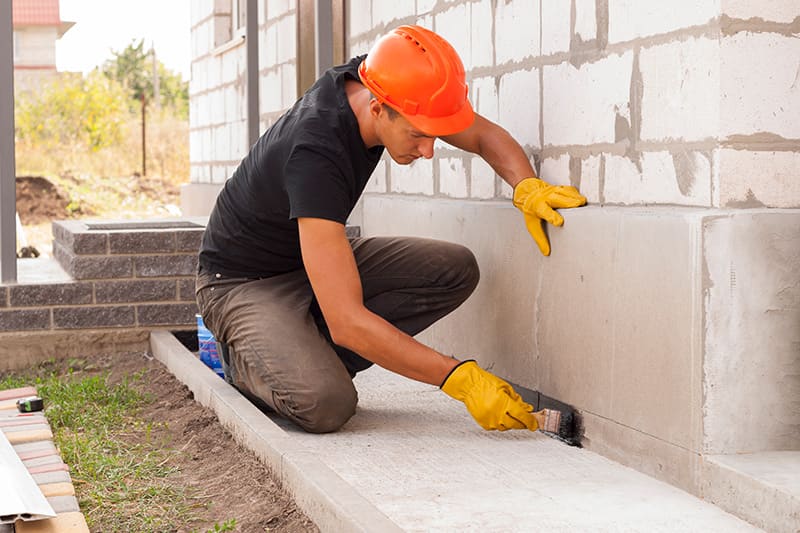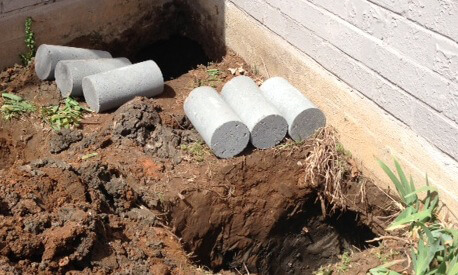How Often Should You Schedule Concrete Lifting Inspections?
The Advantages of Normal Assessments for Foundation Fixing and Long-Term Stability
Normal assessments for foundation fixing are vital for preserving the architectural honesty of a home. They help identify small problems before they intensify into significant issues. House owners commonly neglect the impact of these examinations on long-lasting security and safety and security. By recognizing the benefits of routine exams, it becomes clear how proactive steps can affect home value. Yet, several still ignore the value of a strong foundation. What variables should be thought about when reviewing foundation health and wellness?
Understanding the Relevance of a Solid Foundation
Although commonly overlooked, a strong foundation is essential for the security and durability of any kind of framework. It works as the bedrock upon which buildings, bridges, and various other infrastructures are set up, guaranteeing their ability to hold up against ecological tensions. A sound foundation distributes weight uniformly, stopping uneven settling and lessening the threat of architectural damage in time.
A strong foundation safeguards versus exterior elements such as moisture, bugs, and dirt activity, which can compromise architectural integrity. By spending in durable foundation layout and construction, home proprietors can avoid costly repair work and improve the overall safety of their buildings.
Regular inspections also play a pivotal function in preserving foundation health, allowing for very early discovery of potential problems. Ultimately, understanding the importance of a strong foundation promotes an aggressive technique to construction and maintenance, making sure that structures continue to be secure and practical for years to find.
Common Indicators of Foundation Issues
Determining common signs of foundation problems is necessary for home owners and building supervisors alike. These indications can differ yet usually consist of visible fractures in walls, floorings, or ceilings, which may recommend moving or working out. Windows and doors that stick or fail to close correctly might also indicate underlying foundation problems. Additionally, spaces in between wall surfaces and ceilings or unequal floorings can be signs of instability. Homeowners might notice water pooling in certain locations of the residential or commercial property, showing drainage concerns that can impact the foundation's honesty. Exterior and interior wall protruding can further indicate structural problems. Ultimately, a moldy scent or mold growth might suggest dampness intrusion linked to foundation concerns. Acknowledging these indicators immediately allows for prompt treatments, possibly decreasing expensive repair services and making certain the long-term security of the residential property.

The Duty of Regular Evaluations in Very Early Discovery
Routine inspections play a crucial function in the very early detection of foundation issues, enabling homeowners to resolve possible troubles prior to they intensify. By consistently assessing the condition of a structure, specialists can identify subtle indications of distress, such as minor fractures, unequal settling, or moisture invasion. These very early indications frequently work as forerunners to more extreme structural issues if left unchecked.
Professional examiners use specialized devices and strategies to assess foundation honesty extensively, ensuring that any type of emerging concerns are documented and monitored. This positive method not just help in keeping the foundation's stability but likewise promotes a much deeper understanding of the building's total health and wellness.
The insights acquired from routine evaluations empower homeowners to make informed decisions relating to essential fixings and upkeep (Foundation Repair). Ultimately, the role of early detection with inspections is essential in maintaining the long life and safety of a home's foundation
Cost Financial Savings With Positive Maintenance
Positive upkeep can lead to substantial cost savings for home owners by dealing with foundation problems prior to they require substantial fixings. Regular examinations enable the very early recognition of small issues, such as cracks or drain problems, which can be corrected at a portion of the expense of major repairs. By spending in routine evaluations, homeowners can prevent the acceleration of these problems, protecting against the requirement for costly treatments like support or considerable excavation. Additionally, positive maintenance promotes prompt adjustments to water drainage systems or landscaping, reducing the danger of water damages and soil disintegration that can endanger foundation honesty. Eventually, preserving a solid foundation via consistent upkeep not just protects the home's architectural integrity but also lessens economic pressure over time. This strategy fosters lasting security, making sure that homeowners can take pleasure in peace of mind while safeguarding their investment.
Enhancing Residential Or Commercial Property Worth With a Strong Foundation
A strong foundation can considerably boost a building's worth, making it an important facet for any kind of homeowner. Purchasers often focus on structural honesty when examining possible acquisitions, and a properly maintained foundation represents dependability and safety. Characteristics with a durable foundation are less vulnerable to issues such as cracks, water damages, and insect infestations, which can deter possible buyers and lessen market price.
A strong foundation can lead to reduced insurance premiums, as insurance firms identify the decreased threat linked with steady structures. Home owners purchasing foundation repairs and normal assessments demonstrate dedication to home maintenance, which can cultivate customer confidence. In addition, residential properties with a solid foundation often demand greater resale costs, as they are perceived as long-term investments. Therefore, preserving a sound foundation is not just vital for architectural health and wellness yet also plays a considerable role in making the most of property value in an affordable realty market.

Picking the Right Professionals for Inspections
Ensuring a strong foundation is a substantial financial investment, and choosing the right professionals for assessments plays a pivotal duty in maintaining that honesty. Home owners must look for certified and experienced foundation inspectors who focus on recognizing potential issues. It is vital to validate their credentials, including accreditations and insurance, to validate they click for info meet industry standards.
Furthermore, reviewing evaluations and requesting for referrals can supply insight right into the assessor's reliability and know-how. Professionals ought to use innovative diagnostic tools and have a comprehensive understanding of local soil problems and building codes.
Moreover, it is valuable to pick inspectors who supply thorough reports, describing any worries and recommending options. This transparency helps property owners make educated choices around necessary repair services. Foundation Repair. Ultimately, picking qualified professionals guarantees that foundation assessments are detailed and exact, cultivating long-term stability and satisfaction for home proprietors
Creating a Maintenance Arrange for Your Home
Producing a maintenance schedule is important for house owners to guarantee their building remains in excellent condition. It entails developing the regularity of inspections, focusing on areas that may posture risks, and recording all maintenance tasks. This organized strategy not only aids in identifying possible issues early yet also helps in preparing for necessary repair work successfully.
Establishing Evaluation Frequency
Developing a regular assessment frequency is essential for preserving a home's foundation integrity. Homeowners should think about different aspects, including the property's age, soil type, visite site and climate problems, to determine how often examinations should happen. Usually, an annual inspection is suggested, but homes in areas with severe weather or unsteady dirt might call for even more frequent evaluations. By developing a maintenance timetable, house owners can proactively recognize potential issues and resolve them prior to they intensify into expensive repairs. Consistency in assessments not just safeguards the foundation but additionally boosts overall residential property value. Setting tips or collaborating with a specialist can assure that these critical assessments are not forgotten, eventually adding to the long-lasting security of the home.
Prioritizing Locations of Problem
Frequently prioritizing locations of problem is vital for a reliable maintenance timetable that addresses a home's foundation requirements. Property owners should conduct thorough evaluations to recognize potential issues such as fractures, uneven floors, and water merging around the foundation. By assessing these locations, they can figure out which troubles require instant attention versus those that can be kept track of in time. It is necessary to think about factors such as the extent of the damages, the possible risk to the home, and ecological influences. Producing an upkeep routine that focuses on these concerns warranties that sources are alloted efficiently, ultimately maintaining the honesty of the foundation and lowering long-term repair work costs. A positive strategy can considerably improve a home's general stability and safety.
Documenting Upkeep Activities

Often Asked Questions
How Often Should I Arrange Foundation Inspections?
The regularity of foundation examinations generally depends on numerous elements, consisting of regional environment and soil problems. Professionals recommend organizing evaluations at the very least as soon as a year, or a lot more frequently if problems are presumed or previous repair services were made.
What Equipment Are Utilized During Foundation Inspections?
During foundation assessments, professionals typically more use devices such as laser levels, moisture meters, and digital cameras. These instruments assist evaluate architectural honesty, determine potential issues, and file problems for precise coverage and essential repairs.
Can I Do a Structure Assessment Myself?
One might attempt a structure evaluation independently, yet competence in architectural stability is essential. Expertise of indications indicating concerns, together with correct devices, boosts accuracy, making specialist assessments commonly a lot more dependable for complete evaluations.
Are There Seasonal Considerations for Assessments?
Seasonal considerations for inspections include keeping an eye on dampness levels, temperature fluctuations, and freeze-thaw cycles. These variables can influence soil stability and foundation stability, making it crucial to arrange inspections during proper times throughout the year for ideal assessment.
What Qualifications Should Assessors Have for Foundation Work?
Examiners should have relevant accreditations, experience in architectural design or geology, knowledge of regional building regulations, and experience with foundation fixing techniques. These credentials ensure they can properly evaluate conditions and advise ideal options for foundation issues.